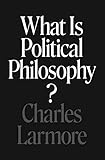What Is Political Philosophy? / Charles Larmore.
Material type: TextPublisher: Princeton, NJ : Princeton University Press, [2020]Copyright date: ©2020Description: 1 online resource (200 p.)Content type:
TextPublisher: Princeton, NJ : Princeton University Press, [2020]Copyright date: ©2020Description: 1 online resource (200 p.)Content type: - 9780691179148
- 9780691200873
- Legitimacy of governments
- Political ethics
- Political science -- Philosophy
- PHILOSOPHY / Political
- G. A. Cohen
- Gerald Gaus
- Jeremy Waldron
- John Rawls
- Law and Disagreement
- Order of Public Reason
- Raymond Geuss
- Theory of Justice
- definition of political philosophy
- history of political philosophy
- introduction to political philosophy
- liberalism
- political and moral philosophy
- political liberalism
- relationship between moral and political philosophy
- relationship between political and moral philosophy
- theory of liberalism
- theory of political philosophy
- 320.01 23
- JA79 .L38 2021
- online - DeGruyter
| Item type | Current library | Call number | URL | Status | Notes | Barcode | |
|---|---|---|---|---|---|---|---|
 eBook
eBook
|
Biblioteca "Angelicum" Pont. Univ. S.Tommaso d'Aquino Nuvola online | online - DeGruyter (Browse shelf(Opens below)) | Online access | Not for loan (Accesso limitato) | Accesso per gli utenti autorizzati / Access for authorized users | (dgr)9780691200873 |
Browsing Biblioteca "Angelicum" Pont. Univ. S.Tommaso d'Aquino shelves, Shelving location: Nuvola online Close shelf browser (Hides shelf browser)

|

|

|

|

|

|

|
||
| online - DeGruyter Basic Rights : Subsistence, Affluence, and U.S. Foreign Policy: 40th Anniversary Edition / | online - DeGruyter How to Drink : A Classical Guide to the Art of Imbibing / | online - DeGruyter After Utopia : The Decline of Political Faith / | online - DeGruyter What Is Political Philosophy? / | online - DeGruyter The Riddle of the Rosetta : How an English Polymath and a French Polyglot Discovered the Meaning of Egyptian Hieroglyphs / | online - DeGruyter France before 1789 : The Unraveling of an Absolutist Regime / | online - DeGruyter Sick Souls, Healthy Minds : How William James Can Save Your Life / |
Frontmatter -- Contents -- Acknowledgments -- Introduction -- 1. The Relation between Political and Moral Philosophy -- 2. The Truth in Political Realism -- 3. Political Liberalism and Legitimacy -- Conclusion -- Index -- A NOTE ON THE TYPE
restricted access online access with authorization star
http://purl.org/coar/access_right/c_16ec
A new understanding of political philosophy from one of its leading thinkersWhat is political philosophy? What are its fundamental problems? And how should it be distinguished from moral philosophy? In this book, Charles Larmore redefines the distinctive aims of political philosophy, reformulating in this light the basis of a liberal understanding of politics.Because political life is characterized by deep and enduring conflict between rival interests and differing moral ideals, the core problems of political philosophy are the regulation of conflict and the conditions under which the members of society may thus be made subject to political authority. We cannot assume that reason will lead to unanimity about these matters because individuals hold different moral convictions. Larmore therefore analyzes the concept of reasonable disagreement and investigates the ways we can adjudicate conflicts between those who reasonably disagree about the nature of the human good and the proper basis of political society. Challenging both the classical liberalism of Locke, Kant, and Mill, and more recent theories of political realism proposed by Bernard Williams and others, Larmore argues for a version of political liberalism that is centered on political legitimacy, rather than on social justice, and that aims to be well suited to our times, rather than universally valid.Forceful and thorough yet concise, What Is Political Philosophy? proposes a new definition of political philosophy and demonstrates the profound implications of that definition. The result is a compelling and distinctive intervention from a major political philosopher.
Mode of access: Internet via World Wide Web.
In English.
Description based on online resource; title from PDF title page (publisher's Web site, viewed 27. Jan 2023)


